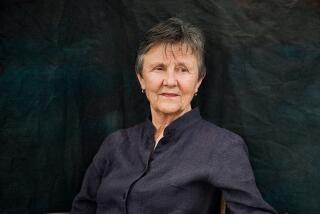Germany Hails Grass’ ‘Overdue’ Literature Nobel
BERLIN — Guenter Grass, whose passionate tales of 20th century history chronicled his generation’s tortured journey through Nazi terror, wartime hardship, exile, shame, political strife and post-unification angst, won the Nobel Prize for literature Thursday.
The 71-year-old writer and rebel greeted the news of his award with a languid smile, proclaiming himself “very pleased” by the recognition accorded novels he wrote four decades ago, including his first and most famous, “The Tin Drum.” He then set off to keep a dental appointment in Hamburg.
At a news conference later in Luebeck, in his studio in the fabled Baltic port that was also the birthplace of 1929 Nobel literature laureate Thomas Mann, Grass heralded the decision announced by the Swedish Academy in Stockholm as an honor for all German writers.
“It has always been my style to look at history from underneath,” Grass, who was interned and endured internal exile in the postwar years, said as he gripped his signature pipe in one hand and a glass of sparkling wine in the other.
Joking that being the 1999 laureate made him “the literary taillight of the century,” Grass said he was pleased to be recognized late in his career, saying the honor would have been a burden as a younger man and a hindrance to inspiration.
The works for which Grass was cited, a trilogy of emotional renditions of the suffering and culpability of Germans in the eastern regions before and after World War II, drew on his childhood memories from the tumultuous years between the wars and his family’s tragic expulsion from his birthplace, which the German war loss transformed from Prussian Danzig to Gdansk, Poland. Though his later works have been criticized for drifting from heartfelt storytelling to political moralizing, Grass’ earlier concoctions of sentimentality, morality, fantasy and the absurd often drew comparisons with Franz Kafka.
Accolades for the author poured in from around the world, and Germans toasted their first Nobel literature winner since 1972, when Grass’ late contemporary, Heinrich Boell, was honored.
“Heinrich Boell would have been satisfied with this choice. I have always tried to carry on his tradition,” Grass told journalists at the news conference-cum-party.
In announcing this year’s laureate--several weeks earlier than usual--the academy cited “The Tin Drum,” published in 1959, in crediting the author with finding a fresh voice for German literature “after decades of linguistic and moral destruction.”
“Here, he comes to grips with the enormous task of reviewing contemporary history by recalling the disavowed and the forgotten: the victims, losers and lies that people wanted to forget because they had once believed them,” the academy said in its announcement. “It is not too audacious to assume that ‘The Tin Drum’ will become one of the enduring literary works of the 20th century.”
In the novel, the first of the Gdansk Trilogy, to be followed by “Cat and Mouse” and “Dog Years,” Grass draws on his own experiences to give soul to simple characters struggling with their fate and reflecting on the choices and actions that brought about their hardships.
Chancellor Gerhard Schroeder proclaimed Grass’ award a cause for celebration for all Germans, and President Johannes Rau said he was moved by the choice of “my good friend of many years.” German Culture Minister Michael Naumann, a New York publisher until returning to his homeland a year ago, hailed Grass’ selection as “worldwide recognition for a unique creator.” The federal parliament broke from its business after receiving word of the academy’s decision and gave the author a standing ovation; the German stock market enjoyed an afternoon rally.
“Guenter Grass is Germany’s most famous living writer. He is being honored for a lifetime of work,” said Claudia Glenewinkel, a spokeswoman for Grass’ publisher, Steidl Verlag in Goettingen.
While most literary critics and political foes put aside their differences with Grass to bask in a fellow German’s glory, some cast the choice of Grass as an afterthought.
“He’s an author of the past. He wrote his most important works in the 1950s and 1960s, so this honor is coming 30 years too late,” Thomas Steinfeld, literary critic for the respected Frankfurter Allgemeine Zeitung, told The Times after the academy’s announcement. “In the last years, he has gained stature as a political figure but lost as an author.”
Steinfeld had written on the eve of the Nobel announcement that he wanted and expected an American writer to be honored this time, as Europeans captured the prize the previous four years.
“I wish an American had won. I do think there is no other author more deserving of the Nobel than John Updike. No one else has so captured the essence of the late 20th century,” said Steinfeld.
Grass’ last novel, “A Broad Field,” was panned by German critics. The highbrow weekly Die Zeit denounced the book, which peripherally told the story of the aftermath of Germany’s 1990 reunification, as “unreadable,” and other reviews used words such as “monstrosity” and “rubbish” to describe it.
But fellow laureates and German literary comrades heralded Grass’ honor as long overdue. “It’s about time,” writer Martin Walser, last year’s recipient of the Frankfurt Book Fair prize, said of Grass’ selection. “He earned this long ago, for ‘The Tin Drum’ alone.”
“The country can be proud,” proclaimed Christoph Hein, president of the German PEN literary society.
South African Nadine Gordimer, the 1991 Nobel literature honoree, called Grass one of the greatest writers of the century.
Grass has clashed with authorities and political luminaries for decades, taking to the streets with other 1960s protesters against war and militarism and passionately joining late Social Democratic Chancellor Willy Brandt’s calls for bridges with the Communist eastern states long before any glimmer of reform could be seen behind the Iron Curtain. Since reunification, Grass has lambasted the “new Germany” for arrogance, greed and ethnic intolerance.
Always a champion of the downtrodden, Grass used the spotlight of his Nobel honor to condemn the Berlin government’s treatment of illegal immigrants, who are held in prison-like facilities for months or years while their cases are investigated. He also told journalists he planned to use some of the nearly $1 million in prize money that comes with literature’s most prestigious award to fund an aid society for Balkan Sinti and Roma, also known as Gypsies.
The author called on fellow Germans to always remain mindful of the crimes of their forebears in the Nazi era and urged Schroeder’s government to finally settle outstanding slave-labor compensation claims if it truly wants to move Germany out of the dark shadows of its past.
Grass was born Oct. 16, 1927, in what was then Danzig, the Baltic Sea port now part of Poland. He was conscripted toward the end of the war to fight for the Nazis and spent a year in a U.S. prisoner-of-war camp in Bavaria after the Allied victory while his family was driven from the eastern region. He worked as a laborer in a chalk mine and dabbled in sculpting and graphics before taking pen to paper in the 1950s.
He now lives in a sprawling farmhouse in the village of Behlendorf with his wife, Ute Grunert.
(BEGIN TEXT OF INFOBOX / INFOGRAPHIC)
Selected Works of Guenter Grass
These are some works by Guenter Grass, who won the Nobel Prize for Literature on Thursday. The titles are given in English where a translation exists. The publication date refers to when the book was published in German.
The Tin Drum, 1959
Cat and Mouse, 1961
Dog Years, 1963
The Plebeians Rehearse the
Uprising, 1966
Local Anaesthetic, 1969
From the Diary of a Snail,
1972
The Flounder, 1977
The Meeting at Telgte, 1979
Headbirths, or, the Germans
are Dying Out, 1980
The Rat, 1986
Show Your Tongue, 1988
The Call of the Toad, 1992
Ein weites Feld (A Broad
Field), 1995
My Century, 1999
Source: Reuters
More to Read
Sign up for Essential California
The most important California stories and recommendations in your inbox every morning.
You may occasionally receive promotional content from the Los Angeles Times.











